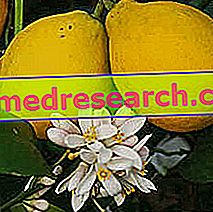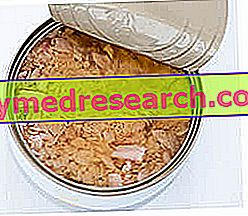
Scientific name
Citrus limon
Family
Rutaceae
Origin
Far East (Northern India)
Synonyms
Lemon
Used Parts
Drug consisting of fruit rinds
Chemical constituents
- Essential oil (limonene) generally obtained by pressing;
- Citroflavonoids (hesperidin, diosmin, rutin).
Lemon in Herbalist: Property of Lemon
Lemon is common as a flavoring for the liqueur industry; but for this purpose it is also used in the pharmaceutical industry where, generally, it is used to mask the unpleasant taste that drugs can have.
However, it is also endowed with interesting phytotherapeutic properties, such as the strengthening and stomachic ones. In fact, the lemon is able to stimulate the salivary secretion and of the other glands of the digestive system; so much so that - in the form of gel - the essential oil of lemon is used to increase the salivary secretion. The lemon pulp is instead used as a rich source of vitamin C.
Biological activity
The lemon, in particular its juice - as well as in the culinary field - is used as a skin cleanser, as it has strong antibacterial properties (a use that is not officially approved).
The citroflavonoids contained in the lemon, on the other hand, have interesting therapeutic properties. More specifically, they possess an anti-inflammatory activity and, furthermore - by influencing the vascular permeability - they are also able to exert a protective action against the blood capillaries.
Furthermore, numerous studies have been conducted on the potential anticancer properties of the limonene contained in the essential lemon oil. These studies have shown that this molecule is able to inhibit the growth of certain types of cancer cells in vitro. The results obtained were encouraging, but new and more in-depth clinical studies are needed to demonstrate the real effectiveness of limonene in counteracting tumor growth.
Lemon in folk medicine and homeopathy
In folk medicine, lemon juice was used for the treatment of fever and acute rheumatism, as well as a remedy against the ingestion of intoxicating agents and especially against opium poisoning.
Furthermore, lemon was also used in folk medicine to treat sunburn and even to replace quinine in malaria therapy.
Lemon is also available as a homeopathic remedy and can be found in the form of granules. In this context, the lemon has indications for the treatment of headaches and migraines, dizziness, vomiting, sore throat and is also used against too abundant menstrual flow.
The dosage of homeopathic remedy to be taken may vary depending on the dilution used.
Side effects
Some cases of contact dermatitis have been reported following skin contact with lemon essential oil.
Contraindications
Avoid use in case of hypersensitivity to one or more components.
Pharmacological Interactions
- alkalizing.



